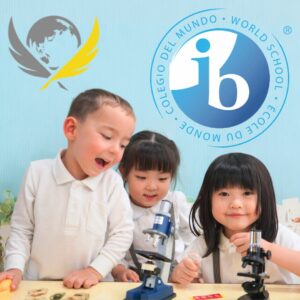Discovering Big Ideas Through Everyday Learning
日々の学びの中で大きなテーマに出会う
One of the unique features of the International Baccalaureate Primary Years Programme (PYP) is its focus on transdisciplinary themes—broad, big-picture topics that connect learning across subjects.
IB初等教育プログラム(PYP)の特徴の一つが、「横断的テーマ」による学びです。
These are大きなテーマで、いろいろな教科をつなげて学ぶことができます。
Even in kindergarten, these themes help young children explore important ideas about themselves, their communities, and the world.
幼稚園の子どもたちも、自分自身や地域、世界について考えるきっかけとなります。
What Are Transdisciplinary Themes?
横断的テーマとは?
Unlike traditional subjects (like math or science) taught separately, transdisciplinary themes invite children to make connections across areas and apply their learning in meaningful ways.
数学や理科などの科目を分けて学ぶのではなく、いろいろな分野をつなげて学びを深めるものです。
The PYP has six themes:
PYPでは次の6つのテーマがあります:
- Who We Are(私たちは誰?)
- Where We Are in Place and Time(私たちはどこにいる?時の中で)
- How We Express Ourselves(どう表現する?)
- How the World Works(世界はどう動く?)
- How We Organize Ourselves(どう組織する?)
- Sharing the Planet(地球を分かち合う)
How Kindergarteners Explore These Themes
幼稚園児はこうやってテーマを探究します
Each unit of inquiry is based on one of these themes. Here’s how our youngest learners might experience them:
探究の単元はこれらのテーマのいずれかに基づいています。たとえば:
- Who We Are: Talking about families, emotions, and traditions to understand identity and relationships.
(家族や感情、伝統について話し、自分や他者との関係を学ぶ) - Where We Are in Place and Time: Exploring local landmarks, seasonal changes, and stories from the past.
(地域の名所、季節の変化、昔話を調べる) - How We Express Ourselves: Using art, music, and language to share ideas and feelings.
(絵や音楽、言葉で気持ちや考えを表現する) - How The World Works: Observing nature, experimenting with materials, and learning about animals and plants.
(自然観察、素材を使った実験、動植物の学び) - How We Organize Ourselves: Learning about daily routines, roles in the classroom, and cooperation.
(日常のルール、役割分担、協力の学び) - Sharing the Planet: Discussing caring for the environment and understanding needs of living things.
(環境を大切にすること、生き物の命を理解する)
Connecting Themes to Japanese Culture
日本文化とテーマを結びつける
In Japan, the rich seasons, festivals, and community life offer wonderful contexts for exploring these themes.
日本には季節感やお祭り、地域の生活が豊かで、テーマ学習にぴったりです。
For example:
たとえば:
- During Cherry Blossom season, children learn how the world works by observing nature and how we express ourselves through traditional songs and crafts.
(桜の季節に自然を観察し、「世界はどう動く?」を学び、伝統の歌や工作で「どう表現する?」を体験) - Celebrating Children’s Day ties into who we are and sharing the planet, emphasizing family and caring for others.
(こどもの日のお祝いは「私たちは誰?」と「地球を分かち合う」につながり、家族や思いやりを感じる) - Local visits to temples or gardens help children discover where we are in place and time.
(寺社や庭園への見学で「私たちはどこにいる?」を実感)
This blending of IB themes with Japanese culture helps children feel connected to both their immediate world and global perspectives.
IBのテーマと日本文化の融合で、子どもたちは身近な世界とグローバルな視野の両方を持つことができます。
Why Transdisciplinary Learning Matters in Kindergarten
幼稚園で横断的学習が大切な理由
By approaching learning through these broad themes, young children:
大きなテーマで学ぶことで、子どもたちは:
- Develop curiosity and critical thinking skills
(好奇心と批判的思考力が育つ) - Make real-life connections across subjects
(教科を超えて実生活とつなげる) - Understand that learning is holistic and interconnected
(学びは全体的でつながっていると理解する) - Become active participants in their own education
(自分の学びに主体的に関わる)
Final Thought
最後に
The PYP transdisciplinary themes provide a rich, flexible framework that invites kindergarteners to explore, question, and understand the world in a meaningful way.
PYPの横断的テーマは、幼児たちが意味ある形で世界を探究し、疑問を持ち、理解を深めるための豊かで柔軟な枠組みです。
They are the roots from which a lifelong love of learning grows.
ここから、一生続く「学びの愛」が育っていきます。


